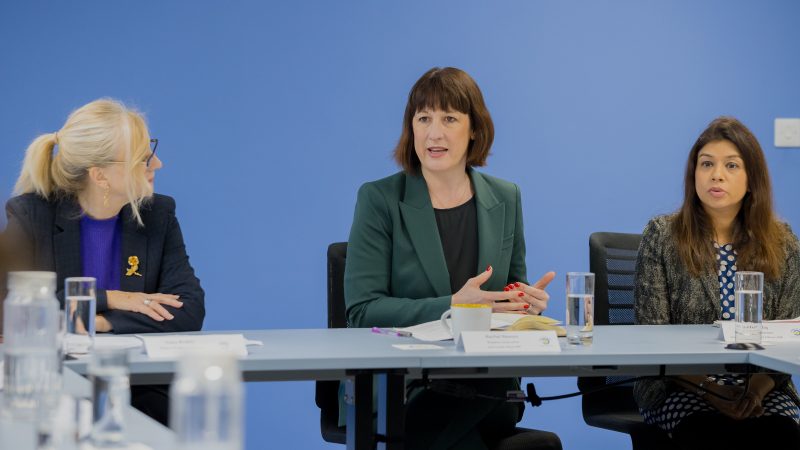
I worked for Gordon Brown as Chancellor and Margaret Thatcher as Prime Minister and, for me, two vital things are missing from Shadow Chancellor Rachel Reeves’ commitment to deliver inclusive growth.
Reeves’ Mais Lecture this week likened the economic transformation she hopes will reverse Britain’s decline to Thatcher’s change of direction in 1979. Shortly after David Lammy described Thatcher as a “visionary leader for the UK”.
As the first female Private Secretary at No 10, I visited a former Welsh mining village with Thatcher in 1989. The mine and its slag heaps had been grassed over, erased: an example, as she saw it, of the regeneration she had achieved more widely. The scars of that process are still there to see in the north-south divide, with so many communities left behind. Reeves’ strategy for growth has to be different.
It’s true Thatcher had vision and that without it she could not have changed Britain as fundamentally as she did. ‘Laser like focus’ is often used by ministers when in truth their eye is off the ball, but that is what Thatcher had, as she relentlessly pursued her vision.
All well and good but Thatcher thrived on fighting what she called ‘the enemies within’, rather than bringing people together, and her vision placed business and market forces at the heart of everything. Society was neglected, even sidelined, and continues to be to this day. Reeves needs to bring it back.
Starmer has spoken of a ‘society of service’, with echoes of the ambition New Labour’s Third Way and Cameron’s Big Society, both of which tried to elevate the role of civil society, and failed.
This is partly because government is hard wired to work in a Thatcherite way, based on competition and business principles, sometimes called New Public Management (NPM). I worked in the Treasury as the Senior Adviser on Public Expenditure to Brown, implementing his reforms, including targets to deliver Labour’s agenda, a further development of Thatcher’s ‘managerial’ style. These targets were rarely discussed with those who had to deliver them, or with the wider society that could make change happen. They were a substitute for dialogue, not an expression of it.
Reeves’ speech puts business once again centre stage for her ‘decade of renewal’ but, unlike Thatcher, she commits to spreading growth equally. I think she’s missing two ingredients that will help her do this.
Working with civil society
First, she and the Starmer government need to work with civil society, nationally and locally, alongside business, to bring people together. Charities, voluntary and community groups can help deliver growth that works for everyone, for example through reforming health and social care and providing preventative social infrastructure on the ground that helps build in good health and care into communities, rather than relying solely on public services.
This social infrastructure needs more public investment, especially in deprived areas. But civil society also brings in extra resources – vital given these are in short supply – and knows how to prevent problems at source, not least because it listens deeply to people at the sharp end, who know what works and what doesn’t. This will save the government money downstream. The Covid crisis is a recent example of this power in action, mobilising social forces for good. The leadership network I helped found, A Better Way, which brings together over 1000 people across the public, private and voluntary sectors, calls this ‘Building a Bigger We’.
Engagement and dialogue between the current government and civil society has gone in the opposite direction – restricted by conditions attached to grant and contract funding and in the Lobbying Act, limitations on the right to protest, and ‘culture wars’ attacks on British institutions, including those elements of the voluntary sector which express opinions or campaign on issues they don’t like.
When government doesn’t listen, people feel a loss of control and services and democracy suffer. I hope Labour will reverse these and other developments that have weakened our democratic spaces, as documented in a report by my think tank, Civil Exchange and the Sheila McKechnie Foundation, Defending our Democratic Space.
‘People will not work with you unless they trust you’
Second, trust as well as stability is an essential requirement to inclusive growth because people will not work with you unless they trust you, and investors will not invest. This is not just trust in government to use public money well, but also trust in a government’s integrity, honesty and incorruptibility.
To rebuild trust, Starmer and Reeves should commit to end what President Obama called ‘truth decay’ and to restore accountability and transparency. The promised Ethics and Integrity Commission is a good start, but more is needed – for example, commitment to an ethical election campaign, respecting the rule of international law and the courts on migration, reducing the use of secondary legislation and ensuring rights to peaceful protest.
Civil society and trust are easy to miss out – but they are essential if Reeves is to deliver on her vision and heal divisions created in the past.
If you have anything to share that we should be publishing about this or any other topic involving Labour, on record or strictly anonymously, contact us at [email protected].
Sign up to LabourList’s morning email for a briefing everything Labour, every weekday morning.
If you can help sustain our work too through a monthly donation, become one of our supporters here.
And if you or your organisation might be interested in partnering with us on sponsored events or content, email [email protected].




More from LabourList
‘Unity or division’: Starmer’s message to voters in Gorton and Denton
Almost half of Labour members oppose plans to restrict jury trials, poll finds
‘How Labour can finally fix Britain’s 5G problem’